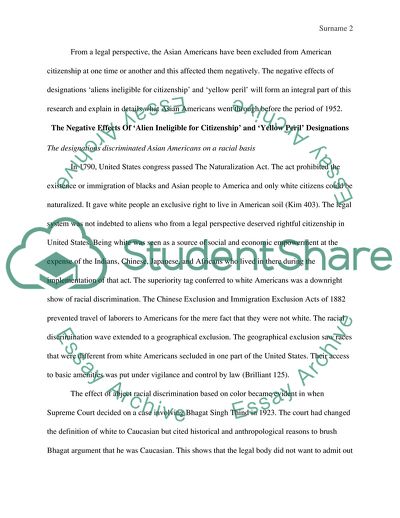Cite this document
(Negative Effects Of Alien Ineligible for Citizenship and Yellow Peril Designations before 1952 Essay Example | Topics and Well Written Essays - 2000 words, n.d.)
Negative Effects Of Alien Ineligible for Citizenship and Yellow Peril Designations before 1952 Essay Example | Topics and Well Written Essays - 2000 words. https://studentshare.org/history/1828365-how-did-the-designations-aliens-ineligible-for-citizenship-and-the-yellow-peril-negatively-affect-asian-americans-in-the-years-prior-to-1952
Negative Effects Of Alien Ineligible for Citizenship and Yellow Peril Designations before 1952 Essay Example | Topics and Well Written Essays - 2000 words. https://studentshare.org/history/1828365-how-did-the-designations-aliens-ineligible-for-citizenship-and-the-yellow-peril-negatively-affect-asian-americans-in-the-years-prior-to-1952
(Negative Effects Of Alien Ineligible for Citizenship and Yellow Peril Designations before 1952 Essay Example | Topics and Well Written Essays - 2000 Words)
Negative Effects Of Alien Ineligible for Citizenship and Yellow Peril Designations before 1952 Essay Example | Topics and Well Written Essays - 2000 Words. https://studentshare.org/history/1828365-how-did-the-designations-aliens-ineligible-for-citizenship-and-the-yellow-peril-negatively-affect-asian-americans-in-the-years-prior-to-1952.
Negative Effects Of Alien Ineligible for Citizenship and Yellow Peril Designations before 1952 Essay Example | Topics and Well Written Essays - 2000 Words. https://studentshare.org/history/1828365-how-did-the-designations-aliens-ineligible-for-citizenship-and-the-yellow-peril-negatively-affect-asian-americans-in-the-years-prior-to-1952.
“Negative Effects Of Alien Ineligible for Citizenship and Yellow Peril Designations before 1952 Essay Example | Topics and Well Written Essays - 2000 Words”. https://studentshare.org/history/1828365-how-did-the-designations-aliens-ineligible-for-citizenship-and-the-yellow-peril-negatively-affect-asian-americans-in-the-years-prior-to-1952.


